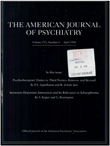Inflammatory mechanisms in Alzheimer's disease: implications for therapy
Abstract
OBJECTIVE: The purpose of this article is to review evidence that inflammatory and immune mechanisms are important in the pathophysiology of Alzheimer's disease and to suggest new treatment strategies. METHOD: The authors review the English-language literature of the last 10 years pertaining to the pathophysiology of Alzheimer's disease. RESULTS: There is ample evidence supporting the hypothesis that inflammatory and immune mechanisms are involved in tissue destruction in Alzheimer's disease. Acute phase proteins are elevated in the serum and are deposited in amyloid plaques, activated microglial cells that stain for inflammatory cytokines accumulate around senile plaques, and complement components including the membrane attack complex are present around dystrophic neurites and neurofibrillary tangles. CONCLUSIONS: Clinical trials of anti-inflammatory/immunosuppressive drugs are necessary to determine whether alteration of these inflammatory mechanisms can slow the progression of Alzheimer's disease.
Access content
To read the fulltext, please use one of the options below to sign in or purchase access.- Personal login
- Institutional Login
- Sign in via OpenAthens
- Register for access
-
Please login/register if you wish to pair your device and check access availability.
Not a subscriber?
PsychiatryOnline subscription options offer access to the DSM-5 library, books, journals, CME, and patient resources. This all-in-one virtual library provides psychiatrists and mental health professionals with key resources for diagnosis, treatment, research, and professional development.
Need more help? PsychiatryOnline Customer Service may be reached by emailing [email protected] or by calling 800-368-5777 (in the U.S.) or 703-907-7322 (outside the U.S.).



